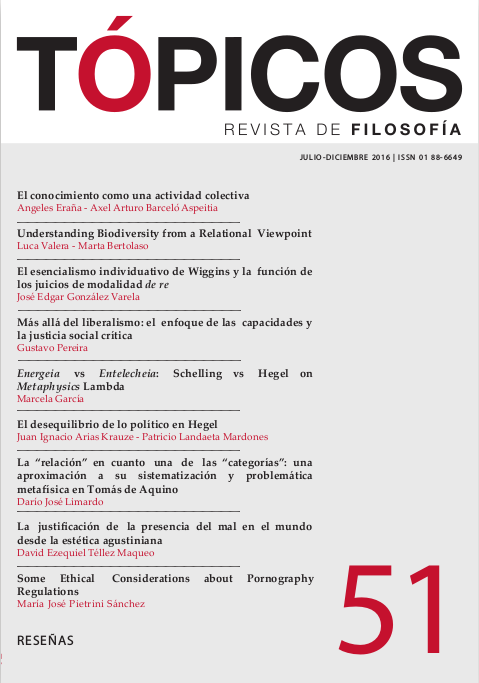Published 2016-07-01
How to Cite
Downloads
Altmetrics
Citas
Abstract
The political problem of civil society is based on its dual form of expression: first, in civil society the external character or purpose of the state is revealed and, second, a split occurs within the same state. Such problem appears contradictory (the outer and inner being at once) is presented in the political thought of Hegel, in order to overcome the dichotomies that in modern political theory appeared as insurmountable. In Hegel’s idea of law, this overcoming is performed by an internalization of those elements that had previously been excluded from politics, such as the natural and the private domain, which emerge in civil society. Thus, this article discusses these elements in order to show how this movement of internalization and externalization of them constitute the event of politics.
References
- Arias Krause, J. (2012). La posición del ciudadano en la sociedad civil burguesa. Derecho y Humanidades, (20), 241-256.
- Bloch, E. (1983). Sujeto-objeto. El pensamiento de Hegel. México: FCE.
- Bobbio, N. (2009). Estado, Gobierno y Sociedad. Por una teoría general de la política. México: FCE.
- De Zan, J. (2009). La filosofía política y social de Hegel. Buenos Aires: Ediciones del Signo.
- Duque, F. (2011). Estudio introductorio. En: Hegel, G. W. F., Ciencia de la lógica. I. La lógica objetiva. Madrid: Abada.
- ____ (1990). Hegel. La especulación de la indigencia. Barcelona: Ediciones Granica.
- Freischmann, E. (1992). La philosophie politique de Hegel. Paris: Gallimard.
- Hegel, G. W. F. (2008). Enciclopedia de las ciencias filosóficas. Madrid: Alianza Editorial.
- ____ (2004). Principios de la losofía del derecho. Buenos Aires: Editorial Sudamericana.
- ____ (2003). Escritos de juventud. Madrid: FCE.
- ____ (1990). Diferencia entre los Sistemas de Filosofía de Fichte y Schelling. Madrid: Tecnos.
- ____ (1979). Sobre las maneras de tratar cientí camente el derecho natural. Madrid: Aguilar.
- ____ (1979a). Enzyklopädie der philosophischen Wissenschaften im Grundrisse. Werke. Band 8. Frankfurt a. M.
- ____ (1979b). Grundlinien der Philosophie des Rechts. Werke. Band 7. Frankfurt a. M.
- ____ (1978). Wissenschaft der Logik.Gesammelte Werke. Bd. 11-12. Hamburg: Felix Meiner Verlag.
- Hobbes, T. (2006). Leviatán, O la materia, forma y poder de una república eclesiástica y civil. México: FCE.
- Hyppolite, J. (1996). Lógica y existencia. Barcelona: Herder.
- Kervégan J-F. (1999). Sociedad civil y derecho privado. Entre Hobbes y Hegel. Res publica, 3, 107-126.
- Marini, G. (1989). Estructura y significados de la sociedad civil hegeliana. Estudios sobre la Filosofía del Derecho de Hegel. Amengual, G. (Cord.). Madrid: Centro de Estudios Constitucionales.
- Marx, C. & Engels, F. (2000). Manifiesto del partido comunista. Madrid: Biblioteca Nueva.






